Us Two - A.A Milne



by Alfred Noyes
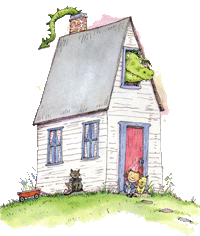
Now the name of the little black kitten was Ink,And the little gray mouse, she called hum Blink,And the little yellow dog was sharp as Mustard,But the dragon was a coward, and she called him Custard.
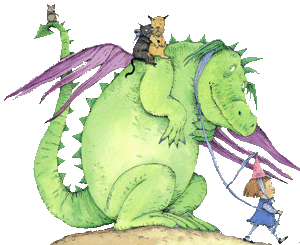 Custard the dragon had big sharp teeth,And spikes on top of him and scales underneath,Mouth like a fireplace, chimney for a nose,And realio, trulio daggers on his toes.
Custard the dragon had big sharp teeth,And spikes on top of him and scales underneath,Mouth like a fireplace, chimney for a nose,And realio, trulio daggers on his toes.
Belinda was as brave as a barrel full of bears,And Ink and Blink chased lions down the stairs,Mustard was as brave as a tiger in a rage,But Custard cried for a nice safe cage.

Belinda tickled him, she tickled him unmerciful,Ink, Blink and Mustard, they rudely called him Percival,They all sat laughing in the little red wagonAt the realio, trulio, cowardly dragon.
Belinda giggled till she shook the house,and Blink said Weeck! which is giggling for a mouse,Ink and Mustard rudely asked his age,When Custard cried for a nice safe cage.
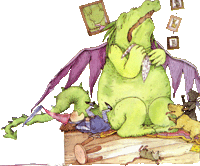
Suddenly, suddenly they heard a nasty sound,And Mustard growled, and they all looked around.Meowch! cried Ink, and Ooh! cried Belinda,For there was a pirate, climbing in the winda.
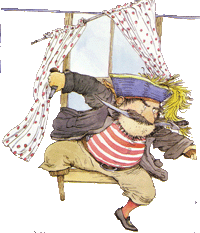
Pistol in his left hand, pistol in his right,And he held in his teeth a cutlass bright,His beard was black, one leg was wood;It was clear that the pirate meant no good.
Belinda paled, and she cried Help! Help!But Mustard fled with a terrified yelp,Ink trickled down to the bottom of the household,And little mouse Blink strategically mouseholed.
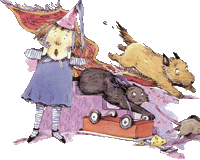 But up jumped Custard snorting like an engine,Clashed his tail like irons in a dungeon,With a clatter and a clank and a jangling squirm,He went at the pirate like a robin at a worm.
But up jumped Custard snorting like an engine,Clashed his tail like irons in a dungeon,With a clatter and a clank and a jangling squirm,He went at the pirate like a robin at a worm.
The pirate gaped at Belinda's dragon,And gulped some grog from his pocket flagon,He fired two bullets, but they didn't hit,And Custard gobbled him, every bit.
Belinda embraced him, Mustard licked him,No one mourned for his pirate victim.Ink and Blink in glee did gyrateAround the dragon that ate the pirate.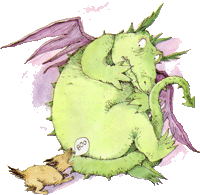 But presently up spoke little dog Mustard,I'd been twice as brave if I hadn't been flustered.And up spoke Ink and up spoke Blink,We'd have been three times as brave, we think,And Custard said, I quite agreeThat everybody is braver than me.
But presently up spoke little dog Mustard,I'd been twice as brave if I hadn't been flustered.And up spoke Ink and up spoke Blink,We'd have been three times as brave, we think,And Custard said, I quite agreeThat everybody is braver than me.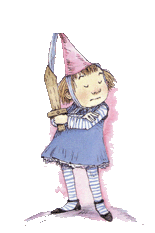 Belinda still lives in her little white house,With her little black kitten and her little gray mouse,And her little yellow dog and her little red wagon,And her realio, trulio little pet dragon.
Belinda still lives in her little white house,With her little black kitten and her little gray mouse,And her little yellow dog and her little red wagon,And her realio, trulio little pet dragon.
Belinda is as brave as a barrel full of bears,And Ink and Blink chase lions down the stairs,Mustard is as brave as a tiger in a rage,But Custard keeps crying for a nice safe cage.
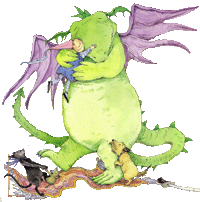



What are little girls made of, made of?
What are little girls made of?
Sugar and spice, and everything nice,
That's what little girls are made of.